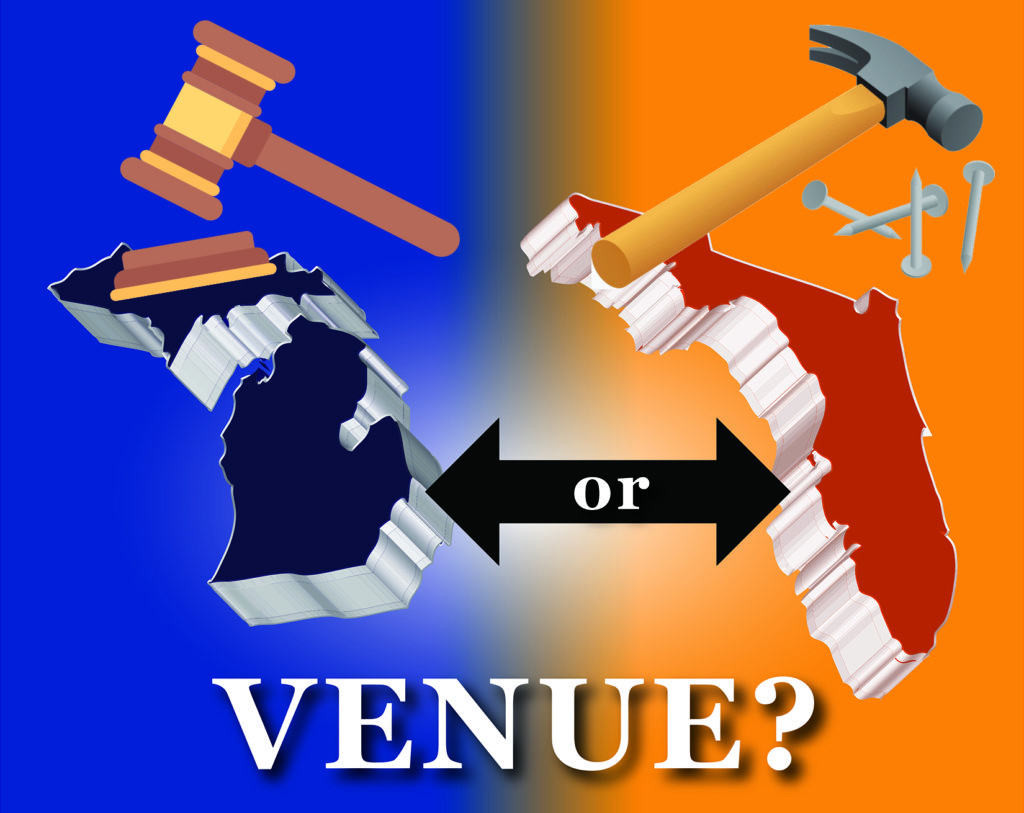Construction Contracts: Arbitration and Venue Provisions
Reading Time: 4 minutes
Many construction contracts for Florida projects contain arbitration provisions that require venue in a state, other than Florida. The term “venue” refers to the location where litigation will take place, in the event a dispute arises. Although Florida has a statute that governs venue in some construction contracts, when the construction project involves interstate commerce, that venue statute may not be applicable. Sachse Construction and Development Corporation v. Affirmed Drywall Corp.; Florida Statute section 47.025.
How Florida Law Relates Venue To Construction Contracts
Section 47.025 of the Florida Statutes provides:
Any venue provision in the contract for improvement to real property which requires legal action involving a resident contractor, subcontractor, sub-subcontractor, or material man, as defined in part one of chapter 713, to be brought outside the state is void as a matter of public policy. To the extent that the venue provision in the contract is void under this section, any legal action arising out of that contract shall be brought only in the state and the county where the defendant resides, where the cause of action accrued, or where the property in litigation is located, unless, after the dispute arises, the parties stipulate to another venue.
In Sachse, the parties’ subcontract involved a construction project in Naples, Florida, between a Michigan general contractor and a Florida-based subcontractor. That subcontract provided that disputes may be submitted to mediation and/or arbitration pursuant to the American Arbitration Association, and that the arbitration final hearing shall take place in Michigan or within 20 miles thereof. The subcontract also contained a choice of law provision, requiring the application of Michigan law.
But Can Florida Law Overrule The Federal Arbitration Act?
When the subcontractor filed a lawsuit in Florida state court, the contractor filed a motion to dismiss or compel arbitration, arguing the parties agreed to arbitration in Michigan, and that the Federal Arbitration Act superseded the Florida venue statute referenced above. The subcontractor, on the other hand, argued the arbitration provision as to venue was unenforceable and section 47.025 required venue in the state of Florida, rather than in Michigan. The trial court agreed with the subcontractor and ordered the contractor to answer the complaint.
On appeal, the court analyzed section 47.025 of the Florida Statutes and the purposes of the Federal Arbitration Act. The appellate court noted the purpose of the Federal Arbitration Act (“FAA”) is to ensure that agreements to arbitrate are enforced according to their terms, and states cannot mandate procedures that are inconsistent with the FAA. The appellate court held that the language of the FAA, along with applicable case law, support the determination that the FAA preempts section 47.025. Thus, because the trial court order required that the parties litigate the matter, the result was, in effect, improperly requiring a judicial resolution of the claims, when the parties agreed to resolve them by arbitration.
Since the trial court never addressed the issue of whether the subcontract involved interstate commerce and the FAA, the appellate court remanded the issue to the trial court for such a determination. Thus, the appellate court did not rule on the issue of the applicability of the FAA. The appellate court did, however, disagree with the general contractor that the face of the subcontract clearly showed that interstate commerce was involved by virtue of the fact that it was a Michigan company doing business with a Florida company.
Conclusion On Construction Arbitration
Parties entering into construction agreements must carefully review the terms and conditions of those agreements. When those contracts contain arbitration provisions, courts will attempt to enforce those provisions in favor of arbitration. As the above-referenced case demonstrates, venue in Florida is not automatic, simply because a Florida contractor is performing work on a Florida project.


